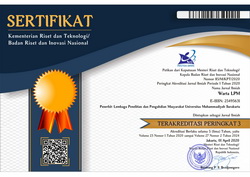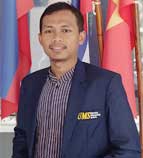Peningkatan Kompetensi Manajemen Keuangan dan Kewirausahaan pada Usaha Mikro di Desa Rowosari Kabupaten Kendal
DOI:
https://doi.org/10.23917/warta.v25i2.638Keywords:
Economic Empowerment, Entrepreneurship, Business Financial Management, Qordhul HasanAbstract
Limited capital and the low quality of human resources are obstacles to develop micro-enterprises that is managed by fishermen’s wives in Rowosari, Kendal, Central Java. Therefore, it is necessary to economic empowerment in the form of entrepreneurship and business financial management training as well as providing business capital stimulus with the qardhul hasan contract to 20 people. The purpose of this community service, a) Improving entrepreneurial and business financial management knowledge and skills of micro business for fishermen’s wives in Rowosari, b) Motivate and improve entrepreneurial competencies and business financial management competencies for fishermen’s wives in Rowosari, so that they become independent, strong women who can help their family economy and improve their welfare. Qardhul Hasan is a financing for the poor, without collateral and interest, while the borrower is required to return it and pay administrative fees. Qardhul Hasan funds are sourced from zakat, infaq, and sodaqah funds. Community service methods: a). Identifying micro-enterprises that have been carried out by fishermen’s wives in Rowosari, Kendal, Central Java, their potentials and problems, b). Giving a Qardhul Hasan financing collaboration with the Rahmat Semesta Foundation. c). Provide entrepreneurial training and business financial management to them, d). Community services performance evaluation. The results show that after getting a Qardhul Hasan loan and receiving training and assistance in the field of entrepreneurship and business financial management, their entrepreneurial and business financial management knowledge and skill increase and hope that their business develops well and their income and welfare increase.
References
Al-Shami, S. S. A., Majid, I., Mohamad, M. R. & Rashid, N. (2017). Household Welfare and Women Empowerment Through Microcredit Financing: Evidence from Malaysia Microcredit. Journal of Human Behavior in the Social Environment, 27(8), 894–910. https://doi.org/10.1080/10911359.2017.1345341
Aydin, N. (2013). Islamic Social Business for Sustainable Development and Subjective Wellbeing. International Journal of Islamic and Middle Eastern Finance and Management, 8(4), 491–507.
Duflo, E. (2012). Women Empowerment and Economic Development. Journal of Economic Literature, 50(4), 1051–1079. https://doi.org/10.1257/jel.50.4.1051
Naminse, E. Y., Zhuang, J. & Zhu, F. (2019). The Relation Between Entrepreneurship and Rural Poverty Alleviation in China. Management Decision, 57(9), 2593–2611. https://doi.org/10.1108/MD-11-2017-1153
Nugroho, S. S. (2015). The Roles of Basic Infrastructure on Poverty Alleviation in Indonesia. Kajian Ekonomi Dan Keuangan, 19(1), 27–44.
Olawale, F. & Garwe, D. (2010). Obstacles to the Growth of New SMEs in South Africa: A Principal Component Analysis Approach. African Journal of Business Management, 4(5), 729–738.
Osman, M. N. A. (2016). Islamic Social Business to Alleviate Poverty and Social Inequality. International Journal of Social Economics, 43(6), 132–136.
Pirantika, A. & Purwanti, R. S. (2017). The Effectiveness of Interest-Free Loan Financing (Qardhul Hasan) as the Social Implementer of Islamic Bank to Reduce Poverty in Surakarta. Yustisia, 6(2), 1–7.
Rauf, R. & Kurnia, P. (2018). Pemberdayaan Ibu-Ibu Kelompok Wanita Tani dan PKK di Desa Sindon Boyolali melalui Pengembangan Produk Greenbos dan Nugget dari sayuran. Warta LPM, 21(2), 1–6. https://doi.org/10.23917/warta.v21i2.4569
Rinaldo, D., Sari, P. A. & Sari, W. P. (2021). Perencanaan Keuangan dan Sumber Daya Manusia sebagai Upaya Perbaikan Tata Kelola Bisnis dalam Menghadapi Masa Krisis Akibat Covid-19. Warta LPM, 24(2), 319–330.
Saraswati, A. M. & Nugroho, A. W. (2021). Perencanaan Keuangan dan pengelolaan Keuangan Generasi Z di Masa Pandemi Covid-19 melalui Penguatan Literasi Keuangan. Warta LPM, 24(2), 309–318.
Sousa, M. J. & Almeida, M. do R. (2014). Entrepreneurial Skills Development. Recent Advances in Applied Economics, November, 135–138.
Susanti, E. & Mas’udah, S. (2017). Women's Empowerment Model in Home-Based Industries in East Java Province , Indonesia. Masyarakat, Kebudayaan Dan Politik, 30(4), 353–366.
Wazin, W. (2018). Karakteristik Ekonomi Rumah Tangga dan Relevansinya dengan Konsep Ekonomi Syariah (Analisis empiris Peran Ibu Rumah Tangga sebagai pekerja Sektor Informal di Provinsi Banten). Al Qalam, 35(1), 1–18.
Widiyanto, Mutamimah & Hendar. (2011). Effectiveness of Qard Al-Hasan Financing as a Poverty Alleviation Model. Economic Journal of Emerging Markets, 3(1), 27–42.
Wolmarans, H. & Meintjes, Q. (2015). Financial Management Practices in Successful Small and Medium Enterprises (SMEs). The Southern African Journal of Entrepreneurship and Small Business Management, 7(1), 88–116.
Downloads
Submitted
Published
How to Cite
Issue
Section
License
Copyright (c) 2022 Warta LPM

This work is licensed under a Creative Commons Attribution 4.0 International License.















